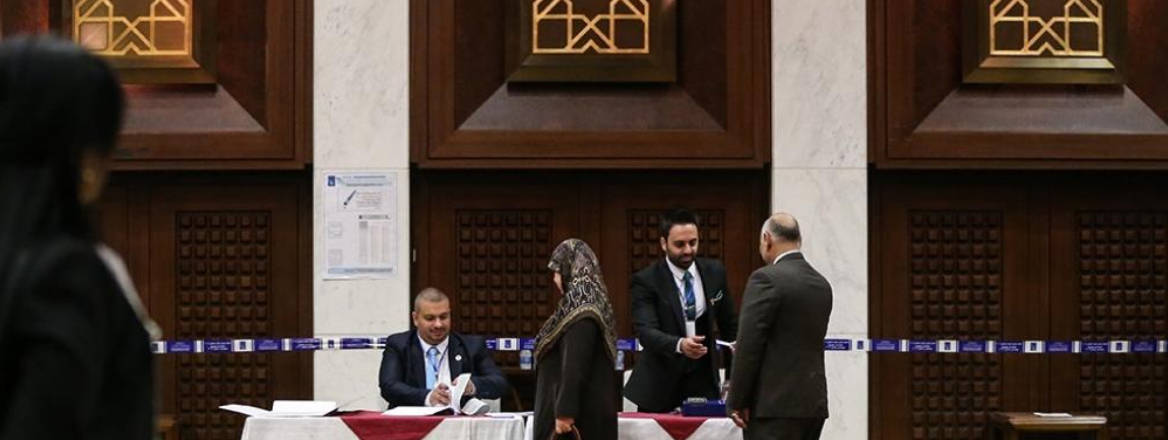Iraq’s post-electoral stalemate is over. But the hard work is just about to begin.
After five months of negotiations and in the face of growing protests around the country, Iraq has taken concrete steps towards forming a new government. On Tuesday 2 October, Iraqi MPs voted to confirm Barham Saleh as president, who promptly asked Adel Abdul Mahdi to become prime minister, with the backing of the two largest blocks in Iraq’s parliament.
The choice of Barham Saleh was not surprising. The Iraqi president must, by constitutional convention, be a Kurd, in order to ensure power sharing between Iraq’s primary ethnic and confessional communities. For candidates to gain support in Baghdad, they can not have supported the Kurdish independence referendum in September 2017. Saleh has been a member of the Patriotic Union of Kurdistan since 1976, the Kurdish party that led opposition to the independence referendum, so it was highly likely that he would became the consensus candidate for the presidency.
Adel Abdul Mahdi, meanwhile, was pointed out by Western diplomats as a clear contender for prime minister shortly after the May parliamentary elections. The former vice president and oil minister is widely seen as a safe pair of hands. He is a known quantity in the West, as well as in Iran, with whom he has reasonable relations. With wide support across the Shia political establishment he should not struggle to form a government.
Still, a largely peaceful transition of power is no guarantee of further stability. Iraq’s May election saw record low turnout, while widespread protests before and after the vote made clear that Iraqis have a number of deep grievances with the state.
The core challenges that the new Iraqi government must address are a bloated bureaucracy, demobilisation, and corruption – the country’s foremost problem. Under Saddam Hussein, the purpose of government institutions was to assure total control, with the result being an environment hostile to private enterprise. Iraqis sought to live their lives by minimising their interaction with the state, and tribal justice was often more consistent in its outcomes than the courts. Land transfers were much easier to conduct without excessive, restrictive and expensive bureaucracy. As a result, Iraqis became accustomed to managing their finances outside of the law. Today, land registration is rare, hampering the courts’ ability to arbitrate property disputes.
At the same time, groups that were opposed to Saddam, like the Badr Organization and Sadrist Movement, necessarily operated as criminals, smuggling equipment and laundering money to keep their activity secret. Today they play a central role in Iraqi politics, but their networks of patronage and extra-legal financial architecture still functions, and means that Iraqis face extortion and bribery when interacting with state institutions.
Foreign investment is deterred by the lack of legal oversight of property and the bribes that are necessary to make Iraq’s bureaucracy function. But it is precisely this investment that is needed if Iraq is to find the money to rebuild the territory liberated from Daesh (also known as the Islamic State), or to begin expanding service provision to Iraq’s south.
The fact that the Badr Organization, Sadrist Movement, and others benefit most from the capacity to transfer state revenues to their own causes inhibits the fundamental reforms to Iraq’s administrative and legal institutions that the fight against corruption requires. This left outgoing prime minister Haider Al-Abadi very cautious in implementing anti-corruption measures. Since then, demands for fundamental reforms have intensified, but it is unclear whether Adel Abdul Mahdi will have any more leeway than his predecessor.
The fact that many political parties control armed wings, which expanded dramatically with state funding, during the battle against Daesh further restricts the government’s capacity to act. How to demobilise these formations is a vast challenge. The government must balance treating the fighters with the respect they demand for having defeated Daesh, while not creating a permanent set of state-funded political militias that undermine government control. Furthermore, parties could interpret any demobilisation as a political attack, seeking to weaken them, reduce their access to ministerial posts, and thereby sever their funding.
Most Iraqis agree – in the public sphere at least – that corruption is the problem. But so long as the same tainted officials remain in post, the country’s political parties are trapped in a ‘Mexican standoff’. The test for Baghdad now is whether politicians will deliver the reforms they have promised. Adel Abdul Mahdi is the product of a corrupt system, but with widespread support in parliament, and an increasingly vocal public, he has an opportunity to bring about change.
The views expressed in this Commentary are the author's, and do not necessarily reflect those of RUSI or any other institution.
WRITTEN BY
Dr Jack Watling
Senior Research Fellow, Land Warfare
Military Sciences


